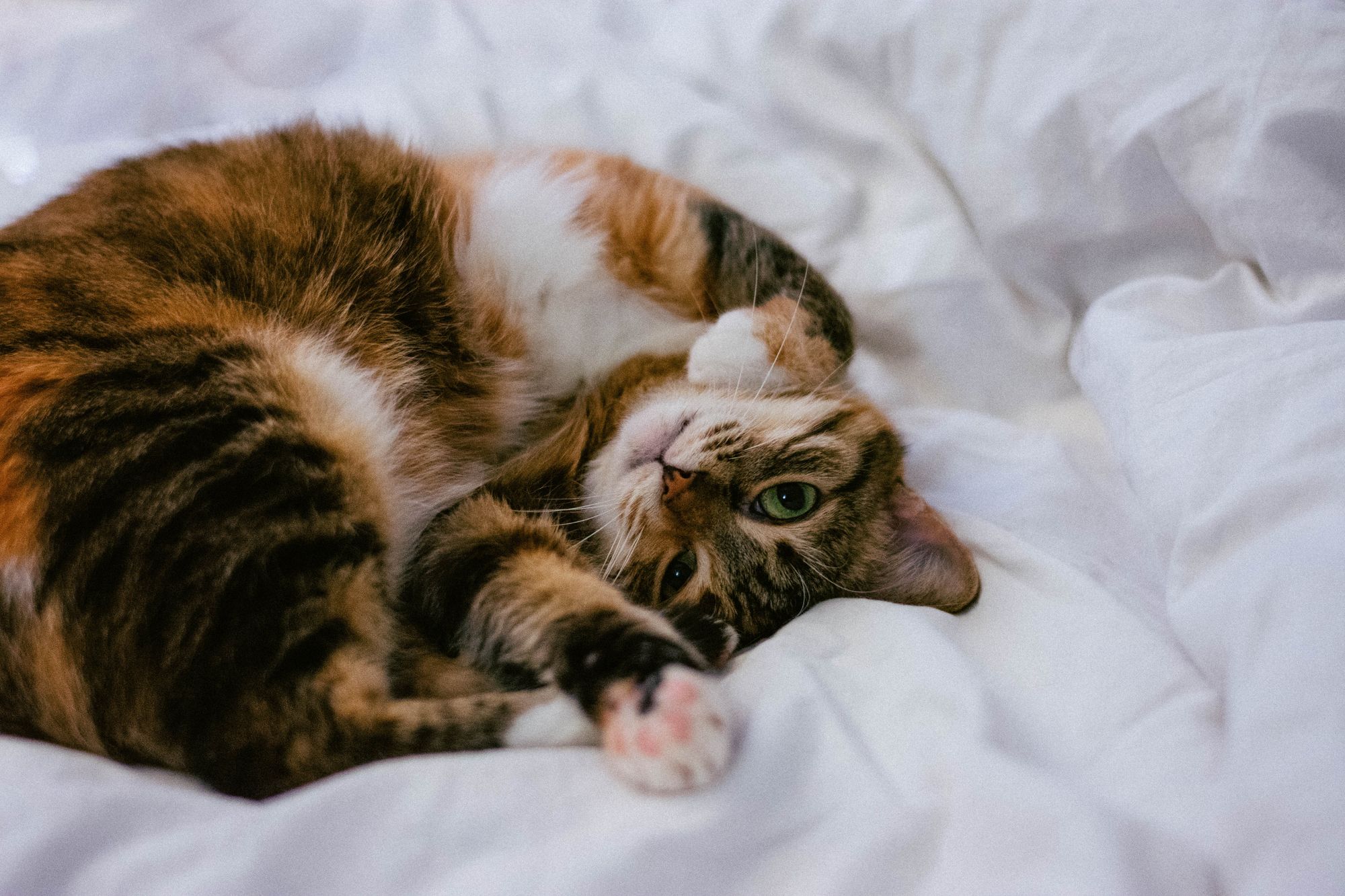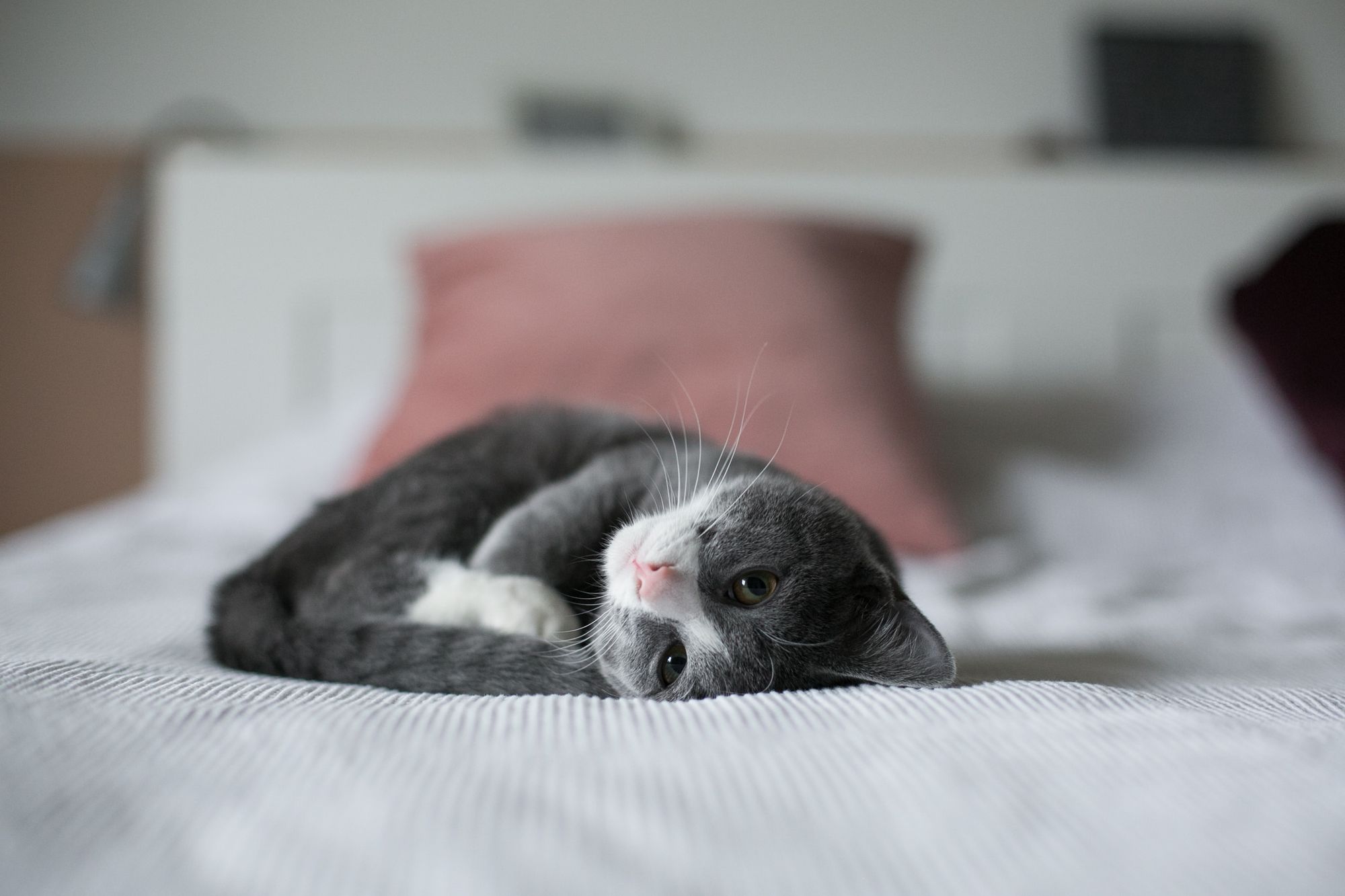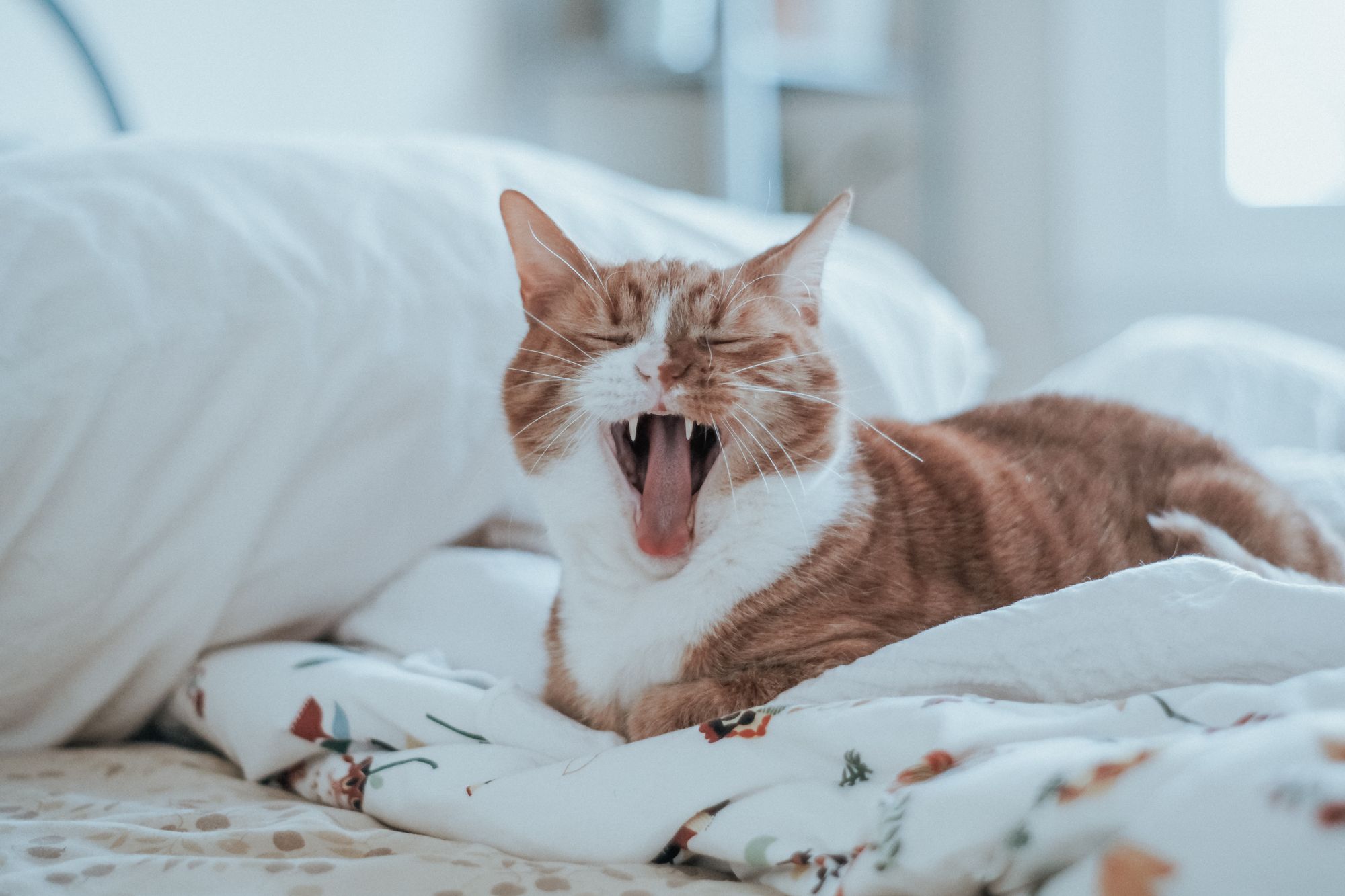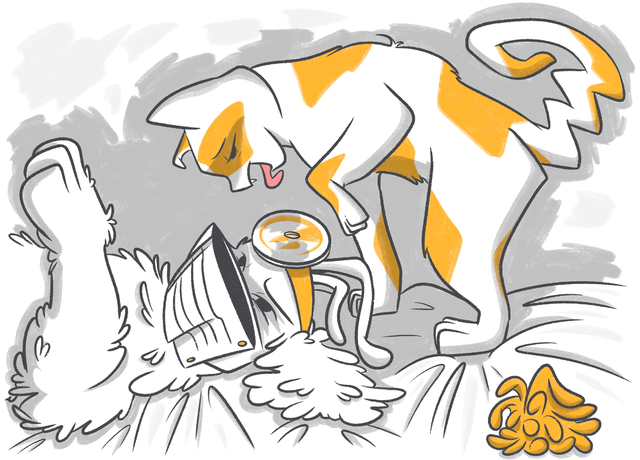If you've ever wondered if cats can get pneumonia, the sad truth is that yes, they can. Even kittens can get this nasty respiratory disease, although it is rare. But what exactly is pneumonia in cats?
Well, think of it as inflammation of the lungs and airways, leading to breathing difficulties and a deficiency of oxygen in the blood. It's like trying to blow up a balloon with a tiny pinhole — not the easiest task, right? If you're worried your cat or kitten may have pneumonia, read on to look at the causes, symptoms, and treatment.
Stop Googling - Ask a Real Vet
Content:
- What Causes Pneumonia In Cats
- How Do I Know If My Cat Has Pneumonia
- Types of Cat Pneumonia
- Treatment for Pneumonia in Cats
- How Can the Petcube Emergency Fund Help With Treatment
- FAQs
- Conclusion
What Causes Pneumonia In Cats
So, let's explore the causes of pneumonia in our whiskered companions.
-
Viruses: Veterinary sources agree that one of the culprits is viral infections that cause lower respiratory infections, like the notorious feline calicivirus. This little troublemaker can damage the airways, leaving our cats vulnerable to developing pneumonia. NCBI research also points to the feline herpesvirus as another potential cause of cat pneumonia.
-
Bacteria: Bacterial infections caused by mycoplasma and chlamydia are another major problem that can cause lung inflammation.
-
Protozoa: A microscopic parasite called Toxoplasma gondii can also contribute to cat pneumonia. We may know this infection as toxoplasmosis, or what Cornell University College of Veterinary Medicine research says is one of the most underdiagnosed parasitic infections cats can pass to humans.
-
Other parasites: Parasites like lungworms and flukes can find their way into our feline's lungs, causing havoc and increasing the risk of pneumonia.
Read more: Everything You Need to Know About Cat Sneezing
-
Fungal infections: several different fungi can cause fungal pneumonia in cats, called mycotic pneumonia. Cats likely inhale spores in the soil, and if they have a weaker immune system, the spores can colonize the moist nasal cavity and cause an infection that can eventually travel to the lungs.
-
Inhaling foreign objects: Lastly, let's not forget that our curious kitties can sometimes get themselves into trouble by inhaling irritating substances, leading to lung injury and, you guessed it, pneumonia.
How Do I Know If My Cat Has Pneumonia
Anytime we deal with an insidious illness like pneumonia, it can be challenging to decipher what's going on inside their tiny bodies. So, how can we tell if our cat has pneumonia? Some common signs and symptoms of feline pneumonia are:
-
Difficulty Breathing: Keep an eye out for rapid or difficult breathing, coughing, wheezing, or green or yellow discharge from the nose. If you notice your cat struggling to catch its breath or showing signs of respiratory distress, it could be a red flag for pneumonia.
-
Lethargy and Loss of Appetite: Pneumonia can zap your cat's energy, leaving them weak and uninterested in food. If you notice a significant decrease in their activity level or if they're turning up their nose at mealtime, it's worth investigating further.
-
Fever and Increased Heart Rate: A cat with pneumonia may run a fever, which an elevated heart rate can accompany. While taking your cat's temperature at home is challenging, observing unusual warmth or feeling their rapid heartbeat can provide valuable clues.
-
Bluish Gums or Tongue: In severe cases, a lack of oxygen can cause a bluish tint to the gums or tongue. If you notice this discoloration, seeking veterinary care is crucial.
Now, you might be wondering how to monitor your cat's symptoms when you're not at home. Well, here's where modern technology comes to the rescue. Enter the Petcube Pet Camera, a nifty gadget that allows you to keep tabs on your cat even when you're away.
.
With the Petcube camera, you can use your smartphone to monitor your cat's activities, check their behavior, and speak to them through the built-in microphone. It's a fantastic tool for staying connected and ensuring your cat's well-being, especially if you suspect they may be dealing with pneumonia.
Types of Cat Pneumonia

There are two basic kinds of pneumonia in cats. These are:
Aspiration Cat Pneumonia
Aspiration pneumonia in cats occurs when foreign objects, such as food, hairballs, or other materials, are inhaled into the lungs. This can lead to inflammation and infection. Common causes include:
Aspiration pneumonia typically affects one lung lobe but can spread if left untreated.
Infectious Pneumonia
Various microorganisms, including bacteria, viruses, and fungi, cause infectious pneumonia in cats. Common pathogens that can lead to pneumonia in cats include:
- Bordetella bronchiseptica;
- Mycoplasma;
- Chlamydia;
- Feline herpesvirus.
These microorganisms can infect the respiratory tract, leading to inflammation and pneumonia. Cats can contract infectious pneumonia through direct contact with infected animals, breathing in respiratory droplets, or exposure to contaminated environments.
Remember, cats with a weakened immune system, such as older cats, kittens, or cats with preexisting health conditions, are far less able to fight off the pathogens that cause pneumonia.
Keeping your cat's environment warm and dry and limiting their access to contagions (such as by keeping them indoors) can help prevent pneumonia in cats.
Treatment for Pneumonia in Cats

We strongly do not recommend treating pneumonia in cats at home with any natural or home remedies. Pneumonia is a severe respiratory condition that requires prompt veterinary attention and professional treatment.
Veterinary care is essential for an accurate diagnosis, determining the underlying cause of pneumonia, and prescribing appropriate medications.
If you think your cat has pneumonia or a respiratory disease, then it is crucial to take these steps:
Veterinary Evaluation
If your cat is displaying symptoms of pneumonia, it's essential to seek veterinary attention promptly. The veterinarian will perform a thorough examination, including auscultation of the lungs and potentially diagnostic tests like bloodwork, X-rays, or a bronchoscopy, to determine the underlying cause and severity of pneumonia.
Antibiotic Therapy & Other Medication
In cases of infectious pneumonia, appropriate antibiotic therapy is crucial. The veterinarian will prescribe antibiotics based on the identified pathogens or administer broad-spectrum antibiotics until they know the cause. Antibiotics help combat bacterial infections and prevent their spread within the respiratory system.
A vet can also prescribe medications called bronchodilators to help your cat breathe easier and get more oxygen into their system.
Supportive Care
Supportive care is vital in the treatment of pneumonia in cats. This may involve:
- Providing supplemental oxygen to assist breathing;
- Administering nebulization or aerosol therapy to help open the airways;
- Encouraging hydration and proper nutrition.
In severe cases, hospitalization with intravenous fluids and close monitoring may be necessary.
Addressing Underlying Conditions
If pneumonia is secondary to an underlying condition, such as feline immunodeficiency virus (FIV), feline leukemia virus (FeLV), or heart disease, treating the primary condition is crucial.
Managing the underlying cause can help alleviate pneumonia symptoms and reduce the risk of your cat getting pneumonia again.
How Can the Petcube Emergency Fund Help With Treatment

The Petcube Emergency Fund can provide financial assistance to pet owners facing unexpected veterinary expenses, including the treatment of pneumonia in cats.
Mild cases of pneumonia for cats may cost less than $500, but if the case is severe and your cat needs to be hospitalized, the cost may easily be upwards of $1500, depending on how much treatment your cat needs.
So, suppose a cat becomes suddenly ill with pneumonia and the owner cannot afford the necessary veterinary care. In that case, the Emergency Fund can help cover the medical expenses.
The 24/7 online veterinary services are also a fantastic way to help you be sure whether or not your cat needs emergency lifesaving treatment. And with the fund covering up to $3000 of emergency vet bills, you don't need to let financial burdens stop you from getting your pet the treatment they need.
FAQs
What is the chance of a cat surviving pneumonia?
With proper, early treatment, many cats can recover and have a good chance of survival. However, aspiration pneumonia (when a cat inhales something that damages their lungs) can be harder to treat and lead to more complications.
What is the chance of a kitten surviving pneumonia?
Kittens have a more challenging time with pneumonia because their immune systems are not fully developed. The chances of a kitten surviving pneumonia depend on their age, general health, and how quickly they get veterinary care. Prompt and proper treatment can greatly increase their chances of survival.
Can I give my cat pneumonia?
You cannot directly give your cat pneumonia. Specific germs like bacteria, viruses, or fungi usually cause pneumonia, and these germs don't usually transfer between cats and humans. However, if your cat comes into contact with an infected animal or a contaminated environment, they can get infected and develop pneumonia.
Is pneumonia contagious in cats?
Yes, pneumonia can be contagious in cats. Some causes of pneumonia, like certain viruses or bacteria, can spread from one cat to another through close contact or respiratory droplets. It's important to practice good hygiene, such as washing hands regularly and keeping infected cats separated, to prevent the spread of contagious pneumonia.
Final Thoughts
Pneumonia in cats is a serious respiratory condition that requires prompt veterinary attention. Whether it is aspirational or infectious pneumonia, timely diagnosis, and appropriate treatment are crucial for a successful recovery. Pet owners should always monitor their cats for any signs of respiratory distress, such as coughing, difficulty breathing, wheezing, or reduced appetite. They should also seek veterinary care if any concerning symptoms arise.
Was this article helpful?
Help us make our articles even better









